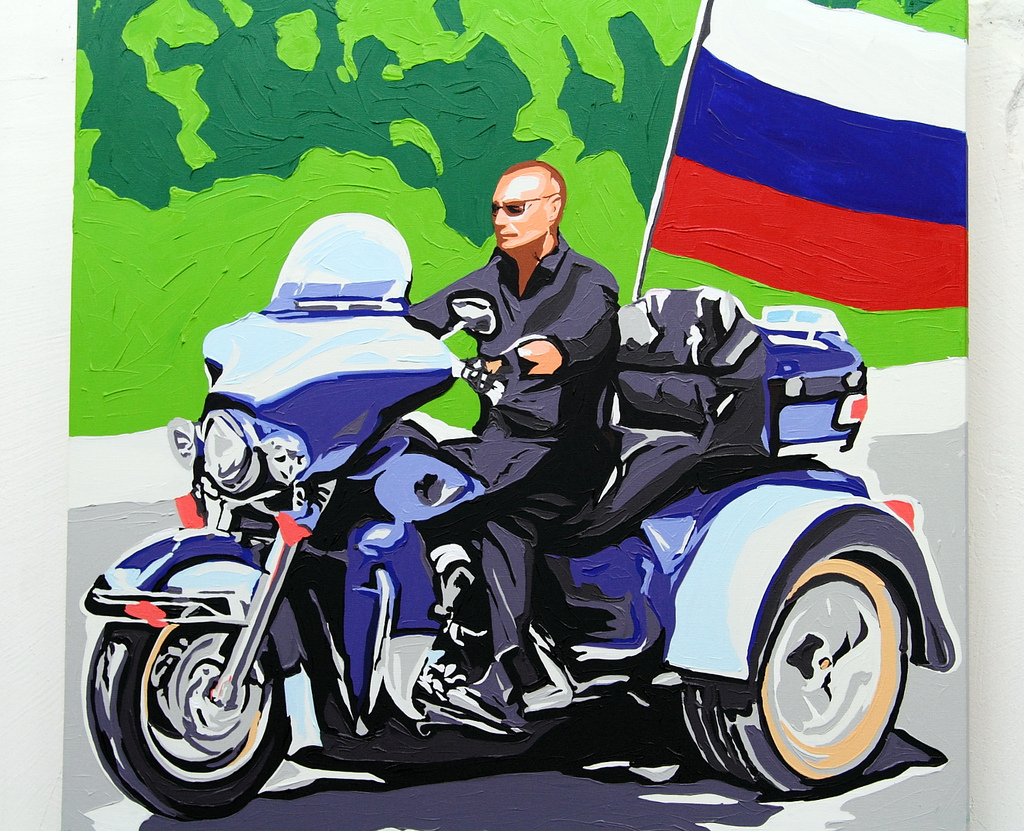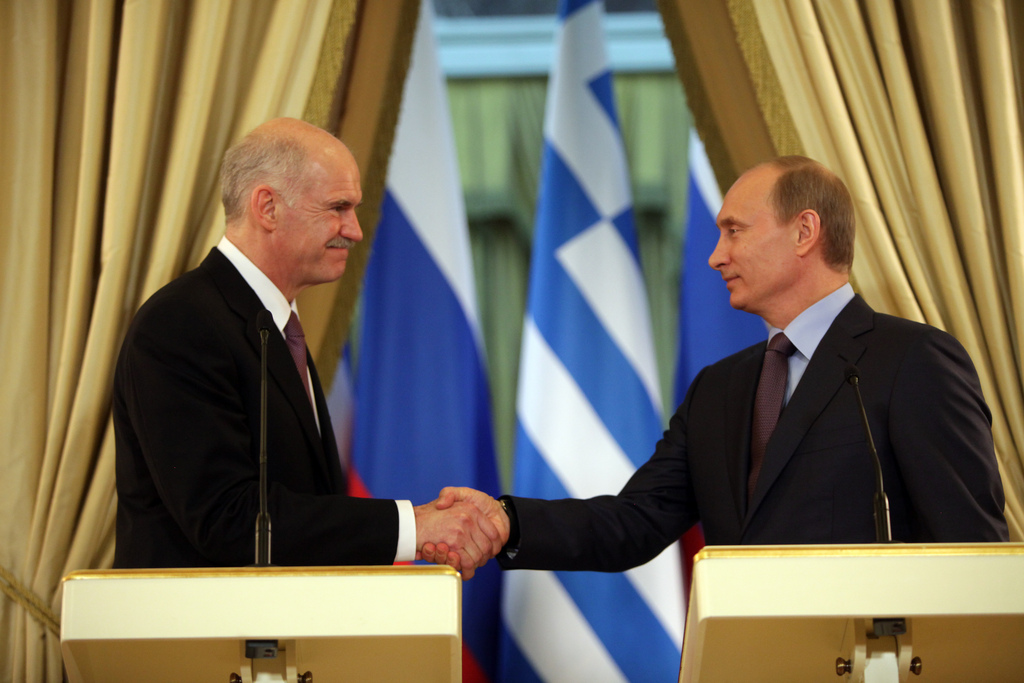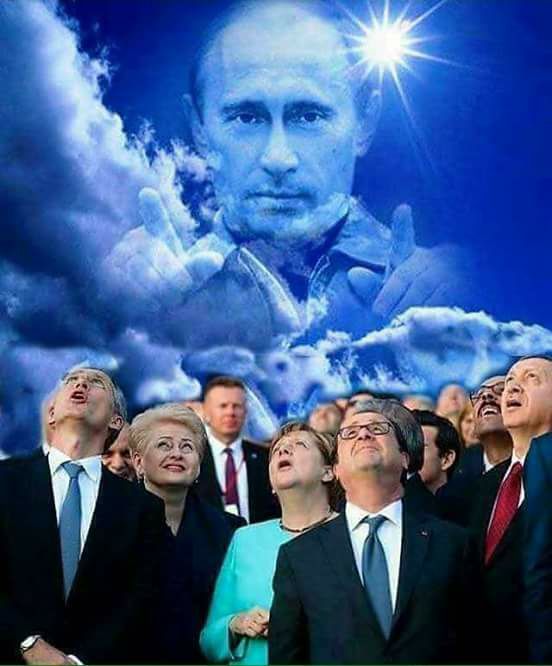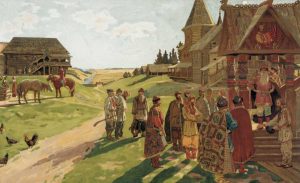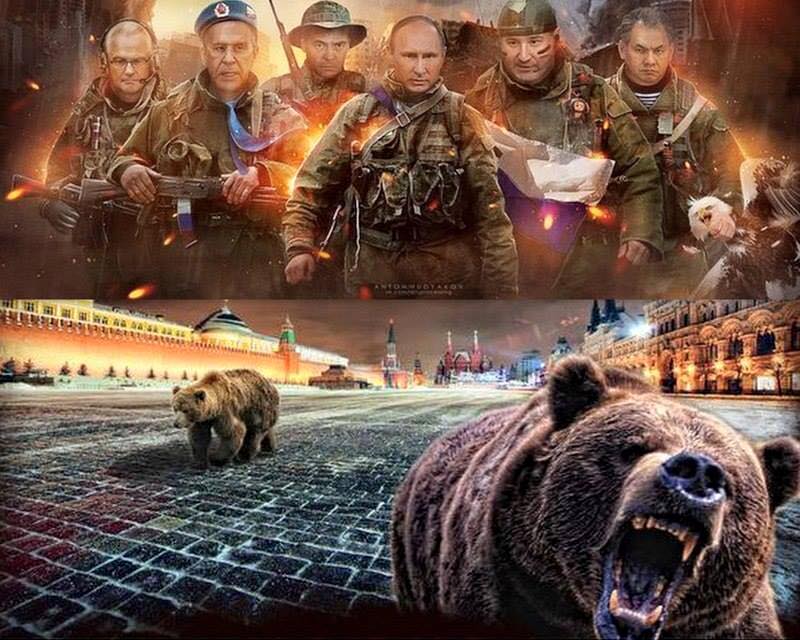
Views: 2675
Is Vladimir Putin the most popular Russian leader of all time?
It certainly looks like it. In a recent survey conducted by the All-Russia Public Opinion Research Center, Putin’s public approval rating soared to an eye-popping 86 percent, which is twice that of Obama’s when he left office in 2016. And what’s more surprising is that Putin’s popularity has held up through a severe economic slump and nearly two decades in office. Unlike most politicians, whose shelf-life is somewhere between 4 to 8 years, the public’s admiration for Putin has only grown stronger over time.
And the phenom is not limited to Russia either. According to a recent survey by the pollster YouGov, “Putin is the third most admired man in Egypt, the fourth in China, Saudi Arabia and Morocco, and the sixth most admired man in Germany, France and Sweden.” And don’t even mention Syria, where naming babies after the Russian president is all-the-rage.
Putin also won Time magazine’s prestigious Person of the Year award in 2007, and has remained among the top ten on that list for the last decade. The only place that Putin is not popular is in the United States where he is relentlessly demonized in the media as a “KGB thug” or the “new Hitler”. According to a 2017 survey by Gallup, only “22% of Americans hold a favorable opinion of Putin” while “72% hold an unfavorable opinion of him.”
There’s no doubt that the media’s personal attacks on Putin have dramatically impacted his popularity. The question that open-minded people must ask themselves, is whether their opinion of Putin is the result of their own research or if their views have been shaped by a vicious, corporate-owned media that denigrates anyone who stands in the way of Washington’s geopolitical ambitions? My advice to these people is to simply read Putin’s words for yourself and draw your own conclusions.
The western media claims that Putin is responsible for a number of crimes including the killing of well-known journalists and political rivals. But is it true? Is the man, who is so revered by the vast majority of Russians, a common Mafia hitman who snuffs out his enemies without batting an eye?
I can’t answer that, but having followed Putin’s career (and read many of his speeches) since he replaced Boris Yeltsin in December 1999, I think it’s highly unlikely. The more probable explanation is that Russia’s foreign policy has created insurmountable hurtles for Washington in places like Ukraine and Syria, so Washington has directed its propaganda ministry (aka– the media) to smear Putin as an evil tyrant and a thug. At least that’s the way the media has behaved in the past.
The US political class loved Yeltsin, of course, because Yeltsin was a compliant buffoon who eviscerated the state and caved in to all the demands of the western corporations. Not so Putin, who has made great strides in rebuilding the country by nationalizing part of the oil industry, asserting his authority over the oligarchs, and restoring the power of the central government.
More important, Putin has repeatedly condemned Washington’s unilateral war-mongering around the world, in fact, the Russian president has become the de facto leader of a growing resistance movement whose primary goal is to stop Washington’s destabilizing regime change wars and rebuild global security on the bedrock principle of national sovereignty. Here’s how Putin summed it up at Valdai:
“We have no doubt that sovereignty is the central notion of the entire system of international relations. Respect for it and its consolidation will help underwrite peace and stability both at the national and international levels…First of all, there must be equal and indivisible security for all states.” (Meeting of the Valdai International Discussion Club, ” The Future in Progress: Shaping the World of Tomorrow, From the Office of the President of Russia).
This is a familiar theme with Putin and one that goes back to his famous Munich manifesto in 2007, a speech that anyone with even the slightest interest in foreign affairs should read in full. Here’s an excerpt:
“We are seeing a greater and greater disdain for the basic principles of international law. And independent legal norms are, as a matter of fact, coming increasingly closer to one state’s legal system. One state and, of course, first and foremost the United States, has overstepped its national borders in every way. This is visible in the economic, political, cultural and educational policies it imposes on other nations. Well, who likes this? Who is happy about this?….”
“I am convinced that we have reached that decisive moment when we must seriously think about the architecture of global security. And we must proceed by searching for a reasonable balance between the interests of all participants in the international dialogue.” (“Wars not diminishing’: Putin’s iconic 2007 Munich speech, you tube).
The Munich speech was delivered a full four years after Washington launched its bloody invasion of Iraq, an invasion that Putin bitterly opposed. The speech shows a maturity of thought on Putin’s part who, unlike other world leaders, isn’t quick to judge or draw hasty conclusions. Instead, he takes his time, analyzes a situation thoroughly, and then acts accordingly. Once he’s made up his mind, he rarely wavers. He’s not a flip flopper.
Putin’s opposition to unipolar world rule, that is, Washington dictating policy and everyone else falling in line, is not a sign of anti-Americanism, but pragmatism. Washington’s 16 year-long rampage across Central Asia, North Africa and the Middle East, has only intensified crises, fueled instability, bred terrorism, and increased the death and destruction. There have been no victories in the War on Terror, just endless violence and mountains of carnage. On top of that (as Putin says) “No one feels safe.”
This is why Putin has drawn a line in the sand in Syria and Ukraine. The Russian president has now committed troops and military aircraft to stop Washington’s aggressive behavior. Once again, this is not because he hates America or seeks a confrontation, but because Washington’s support for violent extremists requires a firm response. There’s no other way. At the same time, Moscow continues to actively seek a peaceful settlement for both crises. Here’s Putin again:
“Only after ending armed conflicts and ensuring the peaceful development of all countries will we be able to talk about economic progress and the resolution of social, humanitarian and other key problems….
It is essential to provide conditions for creative labour and economic growth at a pace that would put an end to the division of the world into permanent winners and permanent losers. The rules of the game should give the developing economies at least a chance to catch up with those we know as developed economies. We should work to level out the pace of economic development, and brace up backward countries and regions so as to make the fruit of economic growth and technological progress accessible to all. Particularly, this would help to put an end to poverty, one of the worst contemporary problems.”…
Another priority is global healthcare…. All people in the world, not only the elite, should have the right to healthy, long and full lives. This is a noble goal. In short, we should build the foundation for the future world today by investing in all priority areas of human development” (Meeting of the Valdai International Discussion Club).
This is why I think that the stories about Putin killing journalists are nonsense. It seems very improbable to me that a man who believes in universal health care, creative labor, ending poverty and “investing in all priority areas of human development” would, at the same time, murder political rivals like a common gang-banger. I find that extremely hard to believe.
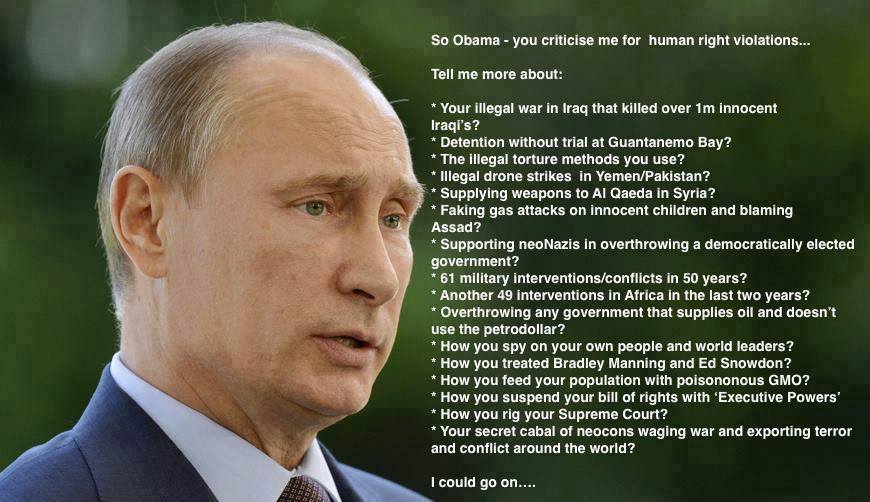 The most interesting part of Putin’s Valdai speech is his analysis of the social unrest that has swept across the EU and US resulting in the widespread rejection of traditional political candidates and their parties. Putin has watched these developments carefully and given the matter a great deal of thought. Here’s what he says:
The most interesting part of Putin’s Valdai speech is his analysis of the social unrest that has swept across the EU and US resulting in the widespread rejection of traditional political candidates and their parties. Putin has watched these developments carefully and given the matter a great deal of thought. Here’s what he says:
“With the political agenda already eviscerated as it is, and with (American) elections ceasing to be an instrument for change but consisting instead of nothing but scandals and digging up dirt…And honestly, a look at various candidates’ platforms gives the impression that they were made from the same mold – the difference is slight, if there is any. …
Yes, formally speaking, modern countries have all the attributes of democracy: Elections, freedom of speech, access to information, freedom of expression. But even in the most advanced democracies the majority of citizens have no real influence on the political process and no direct and real influence on power….
It seems as if the elites do not see the deepening stratification in society and the erosion of the middle class…(but the situation) creates a climate of uncertainty that has a direct impact on the public mood.
Sociological studies conducted around the world show that people in different countries and on different continents tend to see the future as murky and bleak. This is sad. The future does not entice them, but frightens them. At the same time, people see no real opportunities or means for changing anything, influencing events and shaping policy.
As for the claim that the fringe and populists have defeated the sensible, sober and responsible minority – we are not talking about populists or anything like that but about ordinary people, ordinary citizens who are losing trust in the ruling class. That is the problem….
People sense an ever-growing gap between their interests and the elite’s vision of the only correct course, a course the elite itself chooses. The result is that referendums and elections increasingly often create surprises for the authorities. People do not at all vote as the official and respectable media outlets advised them to, nor as the mainstream parties advised them to. Public movements that only recently were too far left or too far right are taking center stage and pushing the political heavyweights aside.
At first, these inconvenient results were hastily declared anomaly or chance. But when they became more frequent, people started saying that society does not understand those at the summit of power and has not yet matured sufficiently to be able to assess the authorities’ labor for the public good. Or they sink into hysteria and declare it the result of foreign, usually Russian, propaganda” (Meeting of the Valdai International Discussion Club).
Putin makes some important points, so let’s summarize:
1/ Elections are no longer an instrument for change.
2/ The appearance of democracy remains, but people no longer have the power to change the policies or the process.
3/ Political impotence has led to frustration, depression and rage. New movements and candidates have emerged that embrace more extreme remedies because the traditional parties no longer represent the will of the people.
4/ Insulated elites have grown more obtuse and unresponsive to the seething anger that lies just below the surface of a seemingly-quiescent society.
5/ More and more people are afraid for the future. They see little hope for themselves, their children or the country. The chasm between rich and poor continues to fuel widespread populist anger.
6/ Trump’s election indicates a broad rejection of the country’s political class, its media, its economic system and its primary institutions.
This is first-rate analysis from a man who has not only spent a lot of time thinking about these things, but also pinpointed the particular event from which the current crisis emerged; the breakup of the Soviet Union. Here’s what he says:
“Last year, the Valdai forum participants discussed the problems with the current world order. Unfortunately, little has changed for the better over these last months. Indeed, it would be more honest to say that nothing has changed.
The tensions engendered by shifts in distribution of economic and political influence continue to grow. … Essentially, the entire globalisation project is in crisis today and in Europe, as we know well, we hear voices now saying that multiculturalism has failed.
I think this situation is in many respects the result of mistaken, hasty and to some extent over-confident choices made by some countries’ elites a quarter-of-a-century ago. Back then, in the late 1980s-early 1990s, there was a chance not just to accelerate the globalization process but also to give it a different quality and make it more harmonious and sustainable in nature.
But some countries that saw themselves as victors in the Cold War, not just saw themselves this way but said it openly, took the course of simply reshaping the global political and economic order to fit their own interests.
In their euphoria, they essentially abandoned substantive and equal dialogue with other actors in international life, chose not to improve or create universal institutions, and attempted instead to bring the entire world under the spread of their own organisations, norms and rules. They chose the road of globalisation and security for their own beloved selves, for the select few, and not for all” (Meeting of the Valdai International Discussion Club).
He’s right, isn’t he? The globalization project IS in crisis, and the reason it’s in crisis is because all of the benefits have gone to the people who crafted the original policy, the 1 percenters. So now the people in the US and EU are lashing out in anger, now they are taking desperate measures to reassert control over the system. That’s what Brexit was all about. That’s what the election of Trump was all about. And that is what the faceoff between Macron and Le Pen is all about. All three are examples of the seething populist rage that’s aimed at the elites who have imposed their own self-aggrandizing system on everyone else precipitating the steady decline in living standards, massive economic insecurity, and the loss of national sovereignty.
 This is the first time I’ve seen the current wave of social turbulence traced back to the dissolution of the Soviet Union, but it makes perfect sense. Western elites saw the breakup of the USSR as a greenlight to maniacally pursue their own global agenda and impose their neoliberal economic model on the world, a process that greatly accelerated following 9-11. The terrorist attacks on the Twin Towers became the seminal event that triggered the curtailing of civil liberties, the enhancing of executive powers and the beginning of a global war of terror. Unconstrained by any serious rival, Washington felt free to impose its corporate-friendly system on the world, redraw the map of the Middle East, occupy countries in Central Asia, and topple secular regimes wherever it went. The triumphalism of western capitalism was summarized in the jubilant words of President George H. W. Bush who stated in 1990 before the launching of Desert Storm: (From now on) “what we say, goes”. The pronouncement was an unambiguous statement of Washington’s determination to rule the world and establish a new order.
This is the first time I’ve seen the current wave of social turbulence traced back to the dissolution of the Soviet Union, but it makes perfect sense. Western elites saw the breakup of the USSR as a greenlight to maniacally pursue their own global agenda and impose their neoliberal economic model on the world, a process that greatly accelerated following 9-11. The terrorist attacks on the Twin Towers became the seminal event that triggered the curtailing of civil liberties, the enhancing of executive powers and the beginning of a global war of terror. Unconstrained by any serious rival, Washington felt free to impose its corporate-friendly system on the world, redraw the map of the Middle East, occupy countries in Central Asia, and topple secular regimes wherever it went. The triumphalism of western capitalism was summarized in the jubilant words of President George H. W. Bush who stated in 1990 before the launching of Desert Storm: (From now on) “what we say, goes”. The pronouncement was an unambiguous statement of Washington’s determination to rule the world and establish a new order.
Now, 27 years later, the United States has been stopped in its tracks in Syria and Ukraine. New centers of economic power are emerging, new political alliances are forming, and Washington’s authority is being openly challenged. Putin’s task is to block Washington’s forward progress, create tangible disincentives for aggression, and put an end to the foreign interventions. The Russian president might have to take a few steps backward to avoid WW3, but ultimately the goal is clear and achievable. Uncle Sam must be reigned in, the war-making must stop, global security must be reestablished, and people must be free to return to their homes in peace.
Origins of images: Facebook, Twitter, Wikimedia, Wikipedia, Flickr, Google, Imageinjection & Pinterest.
Read our Disclaimer/Legal Statement!
Donate to Support Us
We would like to ask you to consider a small donation to help our team keep working. We accept no advertising and rely only on you, our readers, to keep us digging the truth on history, global politics and international relations.


